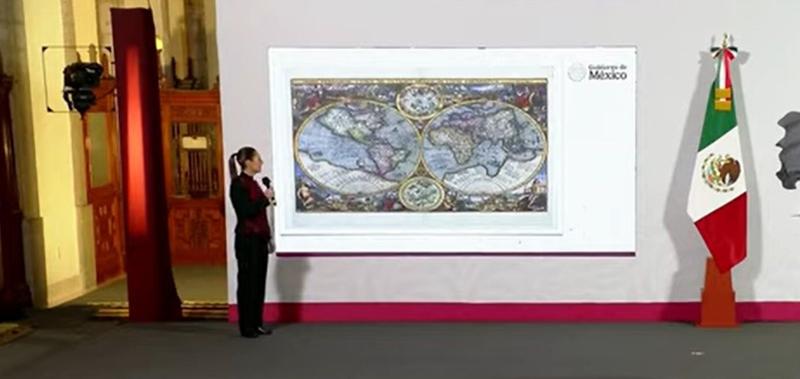Mexican President Claudia Sheinbaum responded to President Donald Trump’s new executive order changing the name of the Gulf of Mexico to “the Gulf of America” with a mix of amusement and firmness.
During her daily press briefing on Tuesday, Sheinbaum responded, remarking, “For us, it is still the Gulf of Mexico, and for the whole world, it will continue to be the Gulf of Mexico.”
On his first day in office, Trump signed several executive orders, including “Restoring Names that Honor American Greatness.”
“The Gulf will continue to play a pivotal role in shaping America’s future and the global economy, and in recognition of this flourishing economic resource and its critical importance to our Nation’s economy and its people, I am directing that it officially be renamed the Gulf of America,” the order stated.
Sheinbaum emphasized that while the U.S. may choose to refer to its portion of the gulf by the new name, Mexico and the international community would stick to the traditional name dating back to 1607.
The exchange underscores the delicate relationship between neighboring countries, especially given recent policy announcements by the returning president.
The order gives 30 days to change the name of the U.S. Continental Shelf area bounded on the northeast, north, and northwest by the States of Texas, Louisiana, Mississippi, Alabama, and Florida and extending to the seaward boundary with Mexico and Cuba in the area formerly named as the Gulf of Mexico.
The order states that the Gulf was a “crucial artery” for early America, noting that as the largest Gulf in the world, the U.S. coastline spans 1,700 miles and contains 160 million acres.
“The bountiful geology of this basin has made it “one of the most prodigious oil and gas regions in the world, providing roughly 14% of our Nation’s crude-oil production and an abundance of natural gas,” the order states, noting through new and innovative technologies “have allowed us to tap into some of the deepest and richest oil reservoirs in the world.”
According to the new order, the Gulf is recognized as one of the most productive fisheries globally, contributing millions to the U.S. economy due to its second-largest volume of commercial fishing landings by region nationwide.
The Gulf is vital to the economy as a primary eco-tourist and recreational destination. It is also home to the multi-billion-dollar U.S. maritime industry.
The order directs an update to the Geographic Names Information System to use the Gulf of America and ensures all federal references use it on maps, contracts, and other documents.
Although the specific financial burden depends on the scope of the name change and the timeline, things such as updating government materials such as maps and educational resources across the federal, state, and local levels, changes across websites, databases, and other systems used by the government make it difficult to estimate a financial impact on American taxpayers
International implications, such as potential disputes over the name change or if the implementation logistics were to affect ports, industries, or other entities using the Gulf, could potentially add additional indirect costs tied to the rebranding, marketing, or operational adjustments from the name change.







